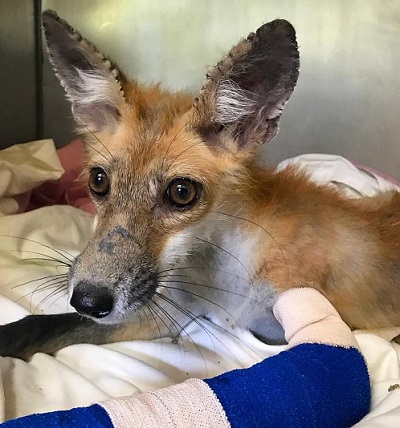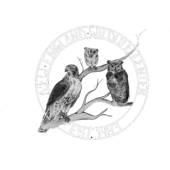September at Cape Wildlife Center is a very exciting and rewarding time of the year.
This is when we get to release back to the wild many of the larger mammals that we have been caring for since April. Most of the rabies vectored animals (mammals that are capable of contracting and spreading rabies if they are infected) came to us as orphans five or six months ago. Over the month of September, we will release 22 raccoons, three Fishers, four red foxes and one skunk. This is in addition to our more short-term patients usually consisting of birds, smaller mammals, and turtles.
In August 2018, we had 378 admissions and released 41 patients. Many still remain in continued treatment.
Raccoons always make up the biggest population of large mammals admitted every year. These curious, playful, masked fur balls are almost impossible to resist when you find one in the wild, especially if they are a young orphan. But, it is important to keep your distance from them and to NOT handle them without gloves, if you must handle them at all. This goes for all mammals that can potentially carry rabies: foxes, bats, otters, skunks, fishers, and woodchucks. Aside from transmitting rabies through saliva or bodily fluids to humans or pets, distemper can be transmitted to pets although cannot harm humans. Raccoons also carry a specific type of roundworm that is deposited through feces and can remain viable for years. This can severely effect humans and other animals.
So how serious are all these diseases? We have not had a positive case of rabies on Cape Cod in any species except bats in many years. This is due in large part to the rabies baiting program that the Cape Wildlife Center participates in. Rabies vaccines are thrown into wooded areas for raccoons and other mammals to eat and therefore become vaccinated. All large mammals that are released from Cape Wildlife Center back into the wild are vaccinated for both rabies and distemper. That said, we cannot take the chance with a human exposure to one of these animals because rabies is deadly and there is no cure or treatment. An exposure is any unprotected contact with saliva or bodily fluids. So please, if you really want any one of these species to have the best chance at survival, do not touch them, cuddle them, pet them, expose your pets or children to them, or otherwise engage with them. That immediately puts both you and the animal at risk.
The adorable fox (pictured below) is one that also came to us in the beginning of summer with both sarcoptic mange and a broken leg. He was brought to us in time to treat his mange successfully and also to have his leg casted. After about five months in treatment, he is now ready to move to a large outdoor enclosure to complete his healing and build up his muscles. His mange is completely gone, he is no longer infectious, and the cast is off his fully healed leg. He will be with another orphan red fox of the same age so they can bond. He is a very special animal, having had to endure many cast changes and an extended stay with us. We have to make sure these animals don’t get bored while here and that they learn hunting and survival skills. To do this, we provide daily enrichment for every one of our animals.
With the large mammals, we use different types of foods and food puzzles to mimic hunting their prey. We also use water in a variety of ways in their enclosures and toys that they must manipulate to develop dexterity. Our raccoons love our automatic soap bubble machine that we attach to the side of their housing. They run around and try to catch the bubbles and hold them. This all helps to keep them mentally sharp and enthusiastic.
Caryn Ritchie is the volunteer coordinator for the Cape Wildlife Center and holds both a Massachusetts wildlife rehabilitator’s license and a federal permit to rehabilitate migratory birds. This article is a repost of an article from The Barnstable Patriot which you can read here.


Recent Comments